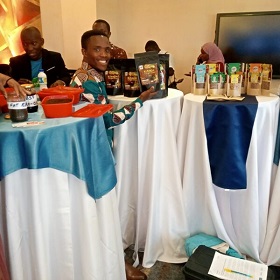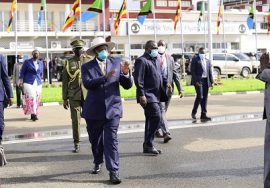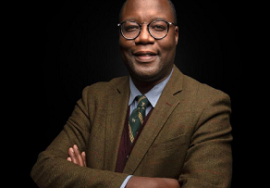
Ginger Farming: How dishonest middlemen pushed Sairus Kiggundu into value addition
Sairus Kiggundu’s unwavering commitment to saving the environment and creating entrepreneurial solutions for the climate stems from his childhood experiences working on ginger farms.
A 2021 Mandela Washington Fellowship alum, Kiggundu grew up in Butambala, a rural district and prominent ginger farming area in Uganda.
“The daily norm from as early as I remember was taking care of ginger. In 2002, my daddy got into a severe accident which resulted in a permanent physical disability, leaving all responsibilities in my mum’s hands. I started working on other people’s farms to access [funding for my] education,” Kiggundu said.
In addition, Sairus collected plastic waste bottles and sold fruit to pay for school fees. This sparked his passion for protecting farmland and prompted him to found Kibajjo Enterprises , an organic ginger farm.
“Growing up in a ginger-growing region, the painful experiences ginger farmers, including my parents, went through being cheated by middlemen bred my deep-rooted passion to change the narrative for farmers in East Africa,” Kiggundu said.
Kibajjo Enterprises’ (“Kibajjo” means pure and indigenous precious ginger) mission is to build an inclusive ginger value chain based on fair trade, sustainable farming, elimination of middlemen, and quality value to maximize profits for farmers.
“We want to help African farmers create a life of profitability to afford to take their children to schools, build homes, and live decent lives,” Kiggundu said.
Kibajjo Enterprises’ core value is responsible and environmentally friendly farming. Sairus said: “We hold our farmers accountable to farm responsibly and preserve Mother Earth. Secondly, our farmers produce ginger in accordance with the UNBS -recommended fertilizers and pesticides for safe harvest. I believe that land and soil protection is highly imperative because it provides an equitable economic opportunity for all people…In addition, it helps to provide watersheds, improves water quality, and restores habitats for the continuity of the ecosystem.”
Kiggundu launched his ginger farming business during a challenging time for most, the second lockdown in Uganda due to the COVID-19 pandemic.
“To be realistic, it hasn’t been a smooth journey. However, my enthusiasm superseded the fears and numerous challenges. In April 2021, I went back to my village and spoke to five farmers about the idea I was creating to solve the challenges the region has encountered for generations. Three farmers were intrigued and gave me 40 kgs [of ginger] for prototyping. In July 2021, I officially launched Kibajjo Enterprises and leveraged social media marketing to raise sales, which enabled us to acquire the grinding machine for production. We generated over 300 USD in our first month’s sales despite lockdown challenges. In only eight months of operation, Kibajjo Enterprises has employed 30 women, 10 youths who wash ginger after leaving the garden, four team members, and 54 farmers registered under our fair trade cycle,” said Kiggundu.
The Global Greenpreneurs 2019 program recipient knows all about the responsibilities of owning a “green business.” “Green entrepreneurship is any business ensuring to meet the triple bottom line: people, environment, and profit. A green business should be sustainable (make profits) with a minimal negative impact on the society (economy) and environment,” Kiggundu said.
Source: YALI website






